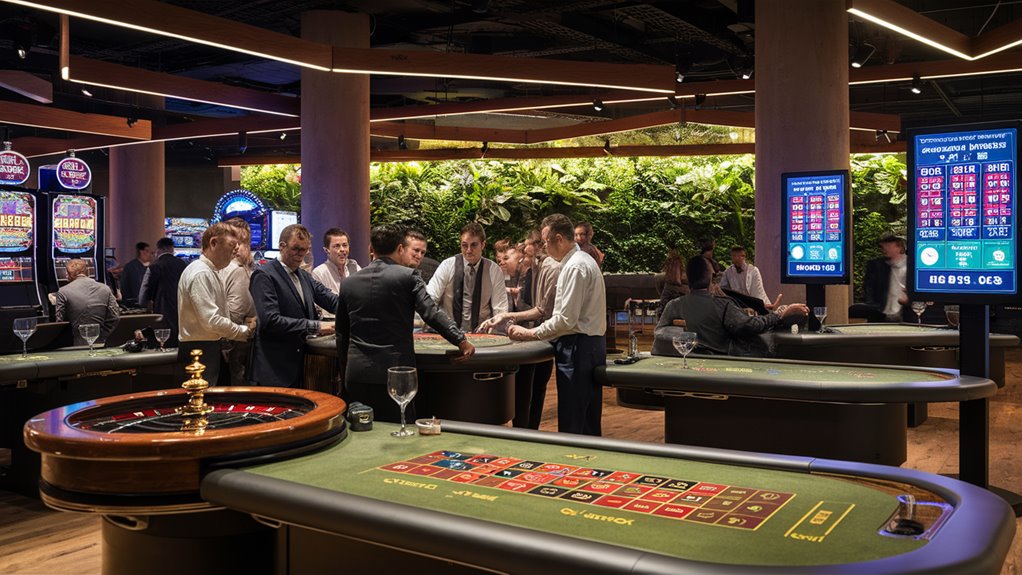Have you noticed how gambling companies are changing their tune these days? It’s pretty interesting, actually. Gone are the days of flashy neon signs promising instant riches and jackpots around every corner. Now, when you look at gambling ads or visit 먹튀검증 안전놀이터 online casinos, you’ll see a whole different approach.
Let’s be real here – the industry has done quite a transformation. These days, you’re more likely to spot messages about setting healthy limits and playing responsibly than seeing promises of becoming an overnight millionaire. And you know what? This isn’t just for show.
Think about it like this: imagine if fast food chains suddenly started focusing on portion control and balanced meals instead of supersizing everything. That’s kind of what’s happening in the gambling world right now. Companies are realizing that taking care of their customers isn’t just the right thing to do, it’s actually crucial for staying in business.
The really fascinating part? This shift isn’t just coming from the goodness of their hearts. Sure, some companies genuinely want to do better, but there’s more to it. With stricter regulations popping up everywhere and public opinion becoming more critical, gambling operators have had to adapt or risk losing everything.
So what’s actually changing on the ground? Well, you’ll see things like prominent responsible gaming tools, clearer terms and conditions, and more transparent odds. Some casinos even reach out to check on players who might be spending too much time or money on their platforms. Pretty different from the old “what happens in Vegas stays in Vegas” attitude, right?
But here’s the million-dollar question: is all this making a real difference, or is it just clever marketing? The truth lies somewhere in between, and that’s what makes this whole shift so interesting to watch unfold.
The Evolution of Responsible Gaming
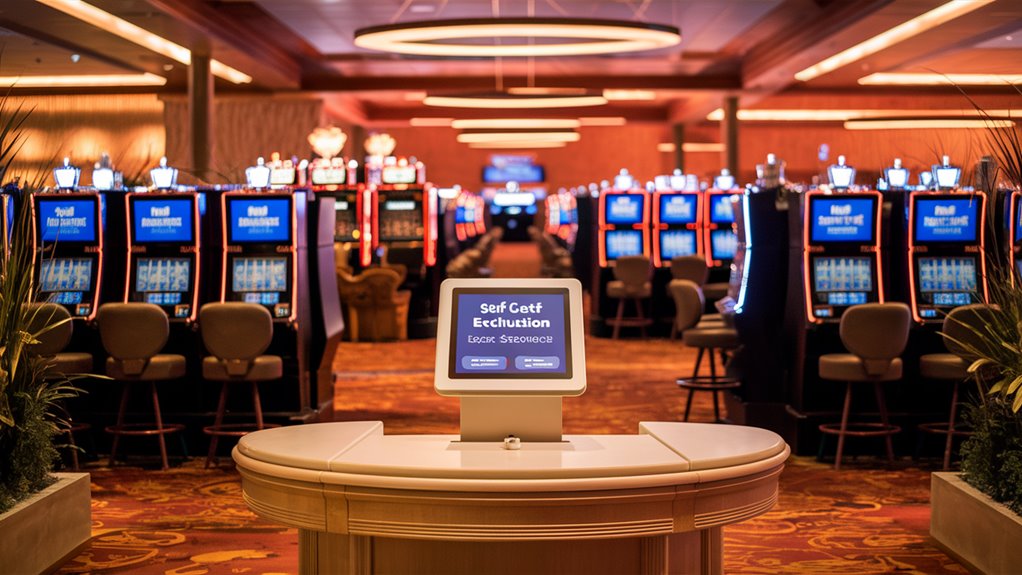
Let’s talk about how responsible gaming has changed over the years. What started as a simple “gamble responsibly” warning has grown into something much more meaningful and comprehensive.
These days, gambling operators take player protection seriously, offering tools like self-exclusion options and deposit limits to help people stay in control.
You know how technology seems to improve everything? Well, it’s making a big difference in responsible gaming too.
Casino operators now use smart AI systems that can spot warning signs of problem gambling, kind of like how your credit card company notices unusual spending patterns. This helps catch potential issues before they become serious problems.
Another interesting change is how transparent everything has become. Remember when casino games felt mysterious and complicated? Now you can easily find information about odds and game rules, and terms and conditions are written in clear, straightforward language.
The staff training has gotten much better too. Think about it like 안전놀이터 메이저사이트 구분법 having a friend who knows when you’ve had enough and helps you make smart decisions.
Casino employees now learn how to recognize when someone might be struggling and how to offer help without making them feel uncomfortable.
What’s really cool is how accessible all these tools have become. Imagine having a safety toolkit right at your fingertips – that’s basically what modern gambling platforms offer.
You can check your gambling habits, set limits, or find professional help, all within the same place you play.
The whole industry seems to have realized something important: taking care of players isn’t just the right thing to do, it’s also good for business. After all, happy, healthy players are more likely to stick around for the long run.
Transparency in Marketing Practices
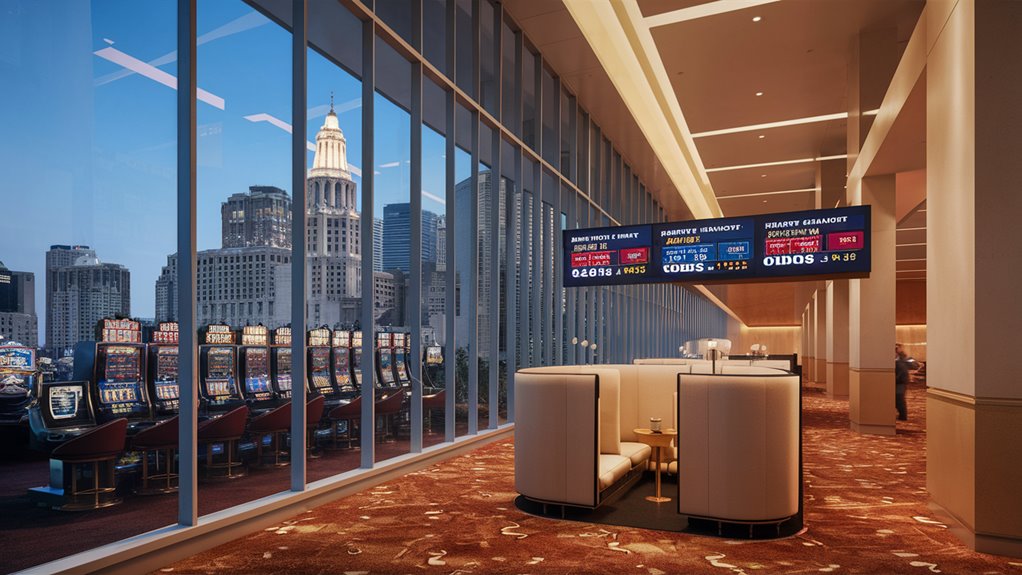
Let’s talk about how gambling companies are changing their marketing game these days. You know how transparency has become a big deal lately? Well, it’s really shaping up how betting operators connect with their customers.
Take a look at any recent gambling ad, and you’ll notice something different. Gone are the flashy promises of instant riches.
Instead, you’ll find clear information about odds and risks, right there in plain sight. It’s kind of like how food companies now have to list all their ingredients – gambling operators are laying all their cards on the table, so to speak.
What’s really interesting is how these companies handle their promotions now. They’re putting responsible gaming messages front and center, complete with helpline numbers and ways to take a break if needed.
Think about those bonus offers you see online. Companies are now spelling out exactly what you need to do to claim them, no hidden catches or fine print.
The digital space has seen some big changes too. Remember those pop-up ads that seemed to target just about everyone? That’s not flying anymore.
Gambling sites are getting serious about age checks and keeping their content away from younger audiences. They’re even breaking down complex stuff like house edges and return rates in ways that actually make sense.
It’s pretty refreshing to see this shift toward honesty in gambling marketing. Sure, companies still want to attract customers, but they’re doing it in a way that helps people understand what they’re getting into.
After all, when you’re spending your hard-earned money, you deserve to know exactly what you’re signing up for, right?
This move toward clearer, more ethical marketing isn’t just good for players – it’s helping create a more sustainable industry where everyone knows where they stand. And that’s something worth betting on.
Player Protection Technologies
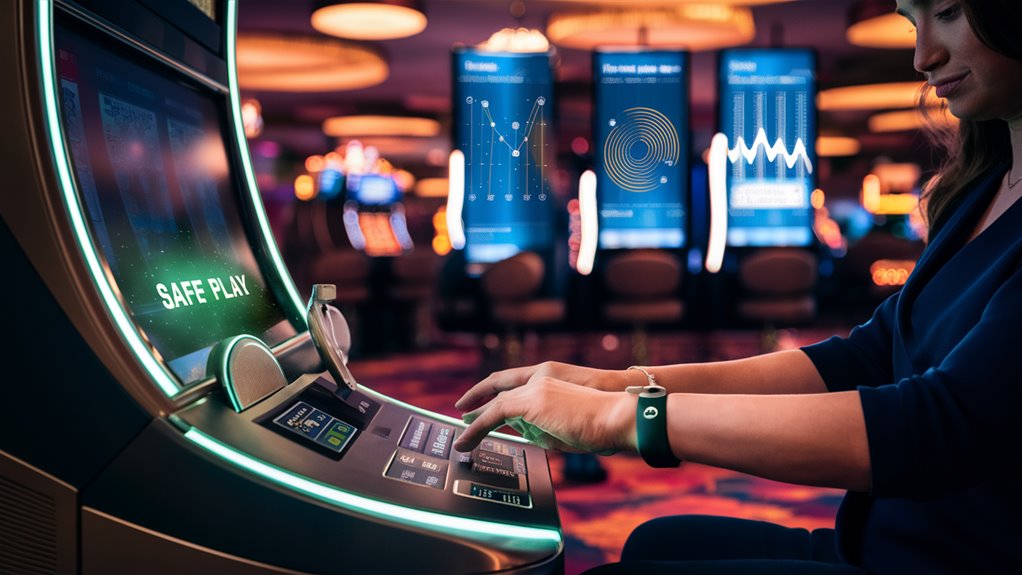
Let’s talk about how gambling operators are making player safety a top priority these days. You know how technology seems to be everywhere now? Well, it’s actually doing some pretty amazing things to keep gamblers safe and in control.
Think of the AI systems as your personal gambling guardian angel. They’re constantly watching your betting patterns, kind of like a friend who notices when you might be overdoing it.
These smart algorithms pick up on little things, from how often you play to your spending habits, and can spot potential issues before they become real problems.
The cool thing is, you’re now in the driver’s seat when it comes to controlling your gambling. Want to set a monthly spending limit? No problem. Need to cap your losses? You can do that too.
These tools aren’t just suggestions, they’re like having a responsible friend who holds onto your wallet when you’ve had enough. Once you set these boundaries, they’re pretty hard to change in the heat of the moment.
Security’s gotten really sophisticated too. Remember when a username and password were enough? Now we’re talking facial recognition, document checks, and multi-step verification processes.
It’s kind of like having a really thorough bouncer at an exclusive club, making sure everyone is exactly who they say they are.
What’s really clever is how these platforms talk to each other now. If you decide to take a break from gambling and block yourself from one site, you can’t just hop over to another one.
The system’s got your back across the board. Plus, you can track your gambling history in real-time, just like checking your bank statement, so you always know exactly where you stand.
Community Impact and Social Responsibility
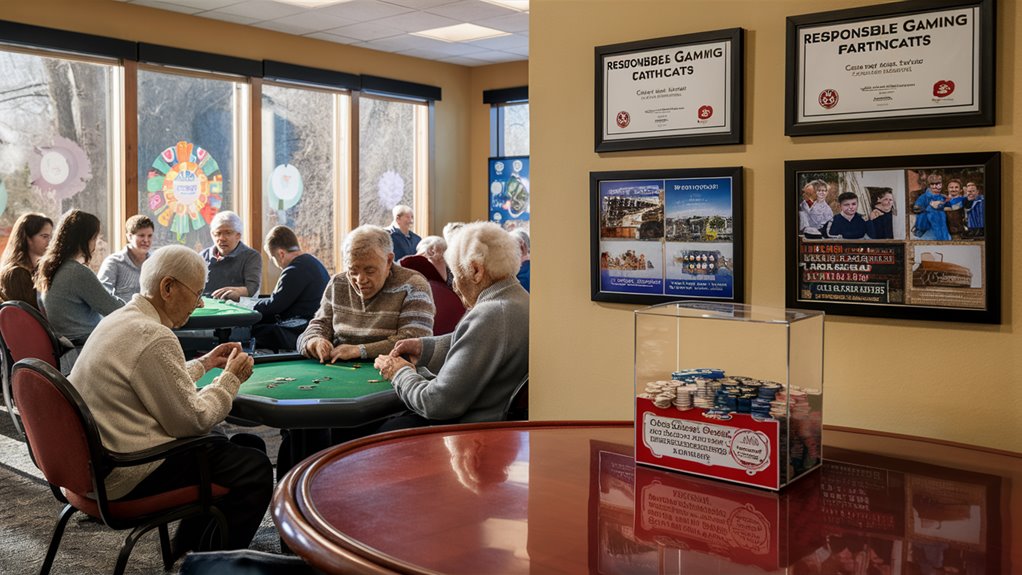
Let’s talk about how gambling companies are stepping up their game when it comes to giving back to communities. You know how businesses often claim they’re doing good for society? Well, many gambling operators are actually walking the talk these days.
Think about it like this – responsible gambling isn’t just about helping individual players anymore. These companies are rolling up their sleeves and getting involved in all sorts of community projects.
They’re putting money into research about addiction, creating jobs for locals, and teaming up with neighborhood businesses to boost the local economy.
Ever notice those educational programs in schools? That’s often these gambling operators at work, teaching kids about the risks before they’re old enough to place a bet. And if you watch local sports, you might spot their logos alongside responsible gaming messages, rather than flashy betting ads. Pretty smart approach, right?
What’s really interesting is how they’re keeping track of their impact. These companies aren’t just throwing money around and hoping for the best.
They’re actually measuring things like problem gambling rates in their areas, checking how nearby businesses are doing, and counting the jobs they’ve created. It’s kind of like a community report card.
The best part? A good chunk of their profits stays right in the neighborhood through taxes and local spending. Instead of being seen as that controversial business down the street, many gambling operators are becoming valuable community partners.
They’re finding ways to run successful businesses while actually helping their neighborhoods thrive. Who’d have thought, right?
Regulatory Changes and Compliance
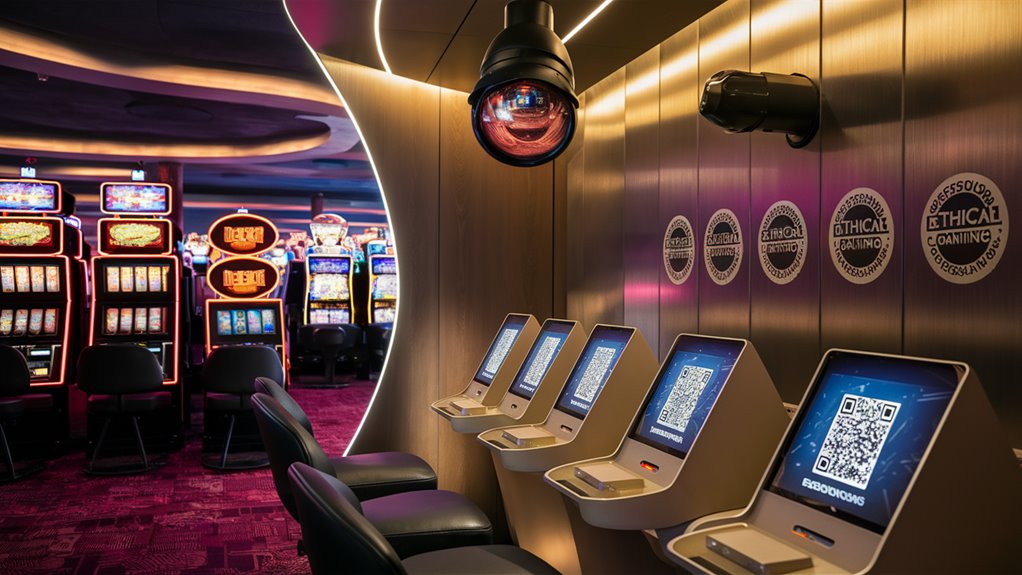
Let’s break down the changing landscape of gambling regulations, because things have gotten pretty complex lately. If you’re running a gambling operation, you’re probably feeling the pressure to keep up with all these new rules and requirements.
Think of modern gambling regulations like a sophisticated security system. It’s not just about having a basic license anymore. Now you need to navigate through layers of requirements, from how you advertise your services to how you verify players and protect vulnerable customers.
Getting your branding right in this environment can be tricky. You’ll need to include clear warning labels on everything, sort of like nutrition facts on food packaging.
Every marketing message needs to be crystal clear about age restrictions, and you can’t sugar-coat the odds of winning. No more flashy promises about getting rich quick.
Smart operators are going above and beyond the basic requirements. This might mean investing in AI tools that spot potential gambling problems early, kind of like how credit card companies flag unusual spending patterns.
You’ll also want robust identity checks and automatic deposit limits to keep things in check.
Here’s the thing about compliance – one slip-up can cost you big time. It’s not just about paying fines (though those can be hefty).
Your brand’s reputation is on the line, and if you mess up badly enough, you could lose your license across multiple regions. Think of it as building trust with both regulators and customers – once it’s broken, it’s really hard to get back.
Remember to keep detailed records of everything you do in marketing and customer service. It’s like having a digital paper trail that proves you’re playing by the rules when the auditors come knocking.
Data-Driven Player Safety Measures
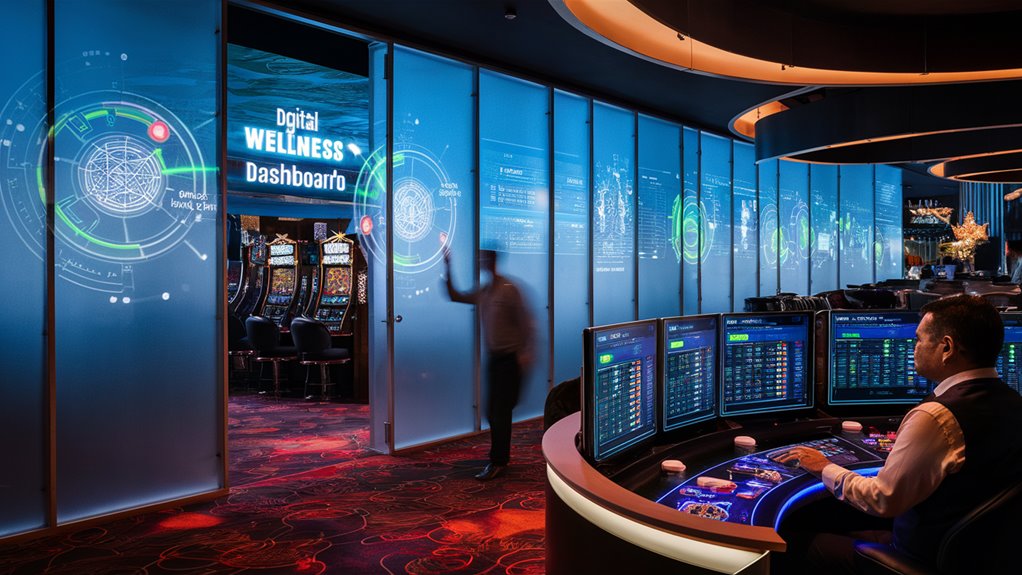
Let’s talk about how data is revolutionizing player safety in the gambling world. You know how technology seems to be changing everything these days? Well, it’s making a huge difference in protecting players from gambling-related problems too.
Modern gambling operators have gotten pretty smart about keeping their players safe. Think of it like having a watchful friend who notices when you might be overdoing it.
Their systems track things like how often you bet, how much money you’re putting in, and how long you’re playing – all to spot potential issues before they become serious problems.
The really cool part is how artificial intelligence helps with all this. Have you ever noticed how Netflix knows exactly what shows you might like? gambling platforms now use similar technology to pick up on concerning patterns.
If someone suddenly starts betting more than usual or chasing losses, the system flags it right away. This could trigger automatic cool-down periods or friendly reminders about responsible gambling.
What’s particularly interesting is how predictive analytics comes into play. It’s kind of like weather forecasting for gambling behavior – operators can spot storm clouds before the rain starts.
They look at player behavior patterns and step in with helpful tools at just the right moment. This might mean suggesting deposit limits or having someone from their support team reach out for a friendly chat.
By understanding how players typically behave, these platforms can offer the right kind of help when it matters most.
Remember those old “please gamble responsibly” messages? Today’s approach is way more sophisticated and personalized. It’s about creating a safer environment where technology helps keep an eye out for everyone’s wellbeing.
Industry Partnerships for Harm Prevention

Let’s talk about how the gambling industry is teaming up to tackle problem gambling. You might be surprised to learn that major operators are actually joining forces with addiction experts, mental health professionals, and researchers to create better solutions.
Think of it like building a safety net, where different experts bring their unique skills to the table. Casino staff work side by side with addiction specialists, learning how to spot the warning signs when someone might be struggling.
It’s similar to how restaurant staff learn to recognize when a customer has had too much to drink, but with more sophisticated training and support systems in place.
What’s really interesting is how these partnerships work in practice. Picture a casino floor manager noticing concerning behavior – instead of just hoping for the best, they now have direct lines to professional help services.
And behind the scenes, universities are conducting long-term studies to understand what makes gambling addictive and which treatments actually work.
The tech side of things is pretty fascinating too. Companies that develop responsible gaming software are now building tools based on real clinical insights.
By sharing anonymous player data with researchers (kind of like how fitness apps track general exercise patterns), operators can spot potential problems early on. This isn’t just theory anymore – these approaches are being tested and refined in real casino environments, making them more effective every day.
Sustainable Business Models

Let’s talk about what makes a gambling business truly sustainable in today’s world. You know how the old approach was all about maximizing profits at any cost? Well, things have changed, and smart operators are now thinking differently about success.
Think of it like running a restaurant. The best ones don’t just try to squeeze every penny from each customer – they focus on creating great experiences that make people want to come back. It’s the same in gambling.
The most successful companies are building their business models around player wellbeing and long-term relationships.
So what does this actually look like in practice? For starters, it means putting real tools in players’ hands to help them stay in control. We’re talking about deposit limits that work like a spending budget, self-exclusion options for when someone needs a break, and friendly reminders about time spent playing.
These aren’t just nice-to-have features anymore, they’re essential building blocks of a responsible operation.
But here’s the really interesting part: when you focus on entertainment value instead of exploitation, something amazing happens. Players start trusting you more. They stick around longer. And your business becomes more stable.
It’s about designing games with fair odds, being completely open about how everything works, and marketing your services honestly.
Want to know what makes this approach really work? It’s investing in your players’ knowledge and wellbeing. That means offering clear education about gambling risks, providing genuine support when needed, and building features that promote healthy playing habits.
Sure, it might mean less short-term profit, but it creates something much more valuable: a sustainable business that people actually trust and want to be part of.
Future of Ethical Gambling

Let’s talk about where gambling is heading in the next few years, because some pretty interesting changes are coming our way. You know how technology keeps changing everything? Well, the gambling world is no exception.
Think about it like this: imagine having a really smart friend who notices when you’re getting a bit carried away with something. That’s basically what AI-powered systems will do, keeping an eye on gambling patterns and stepping in before things get out of hand.
And with blockchain technology, it’ll be like playing cards with transparent rules – no more wondering if everything’s actually fair and square.
The really cool part? These platforms are getting much better at protecting players. It’s kind of like having a universal gym membership card, but for gambling – once you set limits or exclude yourself, it works everywhere.
They’re even bringing in fingerprint and face recognition tech to make sure kids can’t sneak in and people who’ve chosen to stay away actually stay away.
But here’s where it gets interesting. Gambling isn’t just going to be about betting anymore. Picture something more like an entertainment package, where placing bets is just one part of the fun.
You might find yourself in virtual reality casinos with built-in safety nets, or playing games that reward you for keeping things moderate and social.
The folks in charge aren’t messing around either. Regulators are pushing gambling companies to prove they’re actually looking after their players, not just talking about it.
It’s like having to show your work in math class – they want to see the numbers that prove these companies are being responsible.
This shift means we’re looking at a future where having fun and staying safe go hand in hand. Sure, you can still enjoy a flutter, but with way better tools to help you keep things in check. Pretty neat, right?
Common Questions
How Do Ethical Gambling Brands Measure Their Return on Investment?
Let’s talk about measuring ROI in ethical gambling brands, because it’s not just about the bottom line anymore. When you’re running a responsible gaming operation, you need to look at success through multiple lenses.
Think of it like tending a garden – you want healthy growth that lasts, not just quick blooms that wither away. Smart brands track several key indicators to gauge their true return on investment. They look at how well their responsible gaming programs are working, watching for drops in problem gambling behaviors among their players.
Customer lifetime value takes on a new meaning here too. Instead of pushing for maximum spending, ethical operators focus on sustainable playing patterns and healthy engagement levels. It’s about building trust and maintaining it.
Brand reputation matters more than ever in this space. Companies monitor social sentiment, media coverage, and customer feedback to ensure their ethical initiatives are resonating with players and the public. After all, a strong reputation for responsible gaming often leads to more loyal customers.
The real trick lies in balancing player acquisition costs against retention rates. Sure, bringing in new players is important, but keeping existing ones happy and healthy? That’s where sustainable profits come from. Successful brands track these metrics carefully, making sure their marketing spend aligns with their ethical commitments.
Of course, you can’t forget about the traditional financial metrics, but they’re just part of a bigger picture that includes player wellbeing and long-term sustainability. What really counts is creating an environment where both the business and its customers can thrive responsibly.
Can Ethical Branding Increase Customer Loyalty in the Gambling Sector?
Let’s talk about ethical branding in gambling – it’s more important than you might think. When a gambling company shows they genuinely care about player wellbeing and transparency, something interesting happens. Players tend to stick around longer and feel more confident in their choice of platform.
Think about it like choosing a regular hangout spot. You’re more likely to return to a place where the staff is honest with you, looks out for your best interests, and creates a safe environment. The same goes for gambling brands. When they’re upfront about odds, promote responsible gaming, and provide clear information about risks, players naturally develop trust.
Real-world examples show this in action. Companies that implement features like deposit limits, self-exclusion options, and transparent payout systems often see stronger customer relationships. It’s not just about following regulations – it’s about going above and beyond to show players they’re valued as people, not just as customers.
What Percentage of Gambling Revenue Comes From Responsible Versus Problem Gamblers?
Let’s break down some surprising numbers about gambling revenue. You might be wondering where casino profits really come from, and the answer isn’t as straightforward as you’d think. Research shows that problem gamblers, who make up a smaller portion of players, actually generate between 30% to 60% of all gambling revenue. On the flip side, responsible gamblers contribute roughly 40% to 70% of the total revenue.
Now, these numbers can shift quite a bit depending on where you are and what type of gambling we’re talking about. Think of it like this: a slot machine in Las Vegas might attract a different crowd than an online poker room or a local bingo hall. And, well, that’s where things get interesting – each type of gambling tends to draw different proportions of casual players versus those struggling with gambling issues.
The fact that such a significant chunk of revenue comes from problem gamblers raises some pretty important questions about the gambling industry’s sustainability and ethics. It’s kind of like realizing that a restaurant makes most of its money from customers who can’t really afford to eat there. Something to think about, right?
How Do Cultural Differences Affect Ethical Gambling Practices Across Different Regions?
Let’s talk about how gambling practices differ across cultures – it’s actually pretty fascinating when you think about it. You know how what’s perfectly normal in one place might raise eyebrows in another? Well, that’s exactly what happens with gambling around the world.
Take Islamic countries, for instance. They typically have strict no-gambling policies based on religious principles. But hop over to Macau, and you’ll find yourself in what many call the Las Vegas of Asia, where gambling is not just accepted – it’s celebrated as a major part of the entertainment culture.
Western countries have their own unique approach. They’re big on personal responsibility, which is why you’ll see lots of self-help programs and support systems for people who want to control their gambling habits. It’s all about individual choice and accountability.
Things look quite different in many Asian societies. Here, it’s more about how your gambling might affect your whole family or community. There’s this strong sense of collective responsibility, and decisions about gambling often involve considering what your relatives might think.
The really interesting part is how these cultural attitudes shape everything from gambling laws to treatment programs. Some cultures treat it as pure entertainment, others as a potential social issue, and some view it as a moral matter. It just goes to show that when it comes to gambling ethics, one size definitely doesn’t fit all.
Are Ethical Gambling Brands More Successful at Attracting Female Players?
You know, it’s interesting to see how ethical gambling brands are changing the game when it comes to attracting female players. From what we’ve observed, these responsible operators tend to have better luck connecting with women, and there’s a pretty good reason for that.
Think about it this way. When a gambling brand puts safety and responsibility first, it naturally creates an environment where female players feel more comfortable. It’s like choosing a well-lit, reputable restaurant over a sketchy back-alley joint. Women often appreciate brands that take extra steps to protect their players and promote responsible gaming habits.
These ethical operators typically offer more social features too, like chat rooms and community events, which many female players enjoy. They’re not just about placing bets, they’re about creating an experience where people can connect while having fun. Plus, their marketing usually steers clear of those tired old stereotypes and focuses instead on entertainment value and social connection.
What’s really clever is how these brands understand that many women prefer lower-risk gaming options. They offer games with smaller stake requirements and longer play times, making the entertainment value stretch further. It’s not about going all-in with high stakes, but rather enjoying the social aspect and entertainment of responsible gaming.
